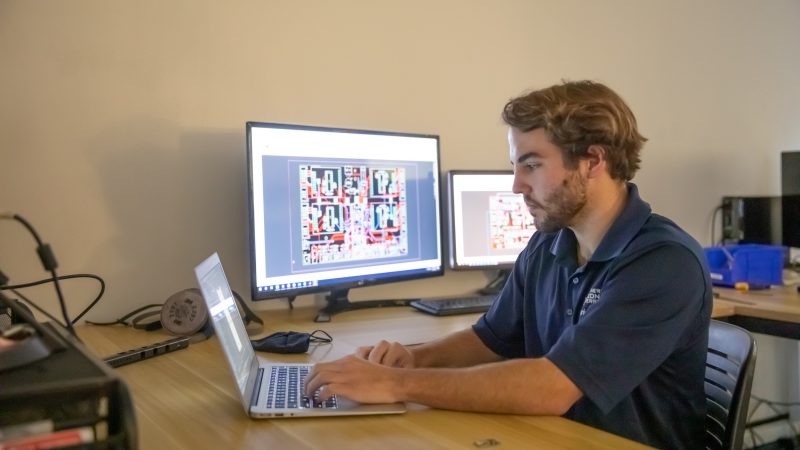Artificial intelligence resources
Overview
Artificial intelligence (AI) technologies are able to analyze and extrapolate from large-scale data sets, and generative artificial intelligence (GenAI) technologies have the ability to create text and other types of content that appear unique. GenAI capabilities have already demonstrated the potential to significantly change the ways in which we teach and work—and are likely to continue doing so into the future.
Foundations
We encourage our faculty, staff, and students to remain current on the fast-paced developments in these technologies and engage in conversations that harness our community’s collective expertise to define the boundaries and expectations that are appropriate for each discipline and learning environment. By doing so, we are confident that we will continue to offer our students an excellent academic experience that prepares them for professional success in careers that will almost certainly include GenAI technologies as crucial additions.
Underlying principles
Our work with GenAI technologies is aligned with larger principles about the role of higher education in preparing for the continued expansion of artificial intelligence capabilities. These principles are captured in the Higher education’s essential role in preparing humanity for the artificial intelligence revolution statement issued during the 18th annual United Nations lnternet Governance, held in October 2023 in Kyoto, Japan—and we are proud to have joined as signatories for this statement’s initial issue, represented by our President José Luis Cruz Rivera.
We encourage everyone to review the complete statement, and share only its top-level principles here:
- People, not technology, must be at the center of our work;
- We should promote digital inclusion within and beyond our institutions;
- Digital and information literacy is an essential part of a core education;
- AI tools should enhance teaching and learning;
- Learning about technologies is an experiential, lifelong process; and
- AI research and development must be done responsibly.
Faculty guidelines
Building on the resources and policies shared earlier, the following guidelines offer initial guidance to faculty for the use of GenAI technologies at NAU.
Provide and discuss clear syllabus policy statements that define permitted and prohibited use in your courses—developed in collaboration with our instructional designers, we offer sample syllabi statements to use as a starting point in offering guidance to students, which may be modified to fit specific course or assignment needs. Unauthorized uses of GenAI, as defined by the instructor, may constitute an academic integrity violation.
Accessibility, personal concerns regarding adoption, and other barriers may cause undue burden on students. Faculty should provide a non-GenAI option for students when incorporating these tools into student assignments.
Current GenAI detector technologies, including NAU’s industry-leading licensed solution Turnitin Originality, are imperfect and may return false positives and false negatives—be cognizant that results such detectors produce cannot be considered definitive evidence of an academic integrity violation.
Grounded in our Data Classification and Handling policy, faculty should not enter data classified as Internal, Sensitive, or Highly Sensitive (Level 2 and above), including non-public research data and personally identifiable student information, into publicly-available GenAI tools. Information shared with GenAI tools using default settings is not private and could expose proprietary or sensitive information to unauthorized parties.
There are myriad possibilities: Explore using generative AI to outline schedules and topics for new modules or lessons, or generate variations of exam questions that assess student learning. Ask students to explore a high-level topic using GenAI chatbots and report their detailed findings, create their own practice exams by generating questions on key course topics, or create and refine outlines and first drafts of writing assignments.
Applications of generative AI in professional practice abound, and these technologies have already augmented the standard toolkits in many occupations. Seek opportunities to make curricular changes that build on the changes you anticipate happening and better prepare students for the evolving professional landscape.
Transformation through Artificial Intelligence in Learning
The Transformation through Artificial Intelligence in Learning program, launching in academic year 2024-2025 with an inaugural set of grants, aims to support faculty in developing innovative approaches for applying AI technologies to various aspects of student learning and our broader educational enterprise.
Sample syllabi statements
These sample statements, which may be modified to fit specific course or assignment needs, may be used by instructors as a starting point to communicate generative artificial intelligence (GenAI) usage expectations to students prior to the start of a course. You may use these at either the course level, or for individual assignments.
While there are various modes of integrating GenAI technologies into courses or assignments, these samples capture just three examples.
All use of generative AI is permitted, with acknowledgement
This course (or assignment) allows the use of generative AI for any work submitted by students, working individually or in groups as directed by class assignment instructions. When submitting an assignment that contributes toward the course grade, there is an expectation to acknowledge what content was generated by generative AI tools (e.g., AI-generated text appears in a different colored font, quoted directly in the text, or using an in-text parenthetical citation). If you have any questions about how to appropriately acknowledge the use of such technologies, please ask for clarification before submitting assignments.
Limited use of generative AI is permitted in specific contexts
This course (or assignment) allows for the use of generative artificial intelligence (AI) technologies as part of the research and preparation phase of the work; for example, using these technologies to assist with research, generating ideas, creating summaries of topics, and developing drafts of text that are then used as an input to the work students do to generate a final assignment. In this use, students should be aware of the potential limitations of using generative AI as a tool for learning and research, since information is not always reliable or accurate, and should critically evaluate the sources, methods, and outputs of generative AI systems. Any final work submitted by students that contributes toward the course grade is expected to be generated by the students themselves, working individually or in groups as directed by class assignment instructions. Submitting final work created by generative AI constitutes an academic integrity violation. If you have any questions about this policy or if you are unsure whether a particular use of generative AI is acceptable, please ask for clarification before using such technologies.
No use of generative AI tools permitted
This course (or assignment) expects that any work submitted by students that contributes toward the course grade, including all process work, drafts, brainstorming artifacts, and final work, will be generated entirely by the students themselves, working individually or in groups as directed by class assignment instructions. Any use of generative artificial intelligence tools, such as ChatGPT, constitutes an academic integrity violation.
Resources
The following resources provide additional information on GenAI and opportunities to engage in discussions with colleagues:
- A high-level synopsis on GenAI and information for both faculty and students can be found on the Generative AI library guide.
- Broad recommendations on responding to the emergence of GenAI technologies for faculty and academic leaders can be found in the Generative AI in Education task force report, published in June 2023.
- Available to all Northern Arizona University faculty and staff, the Generative AI @ NAU Microsoft Teams site allows users to ask questions and contribute to the conversation.

